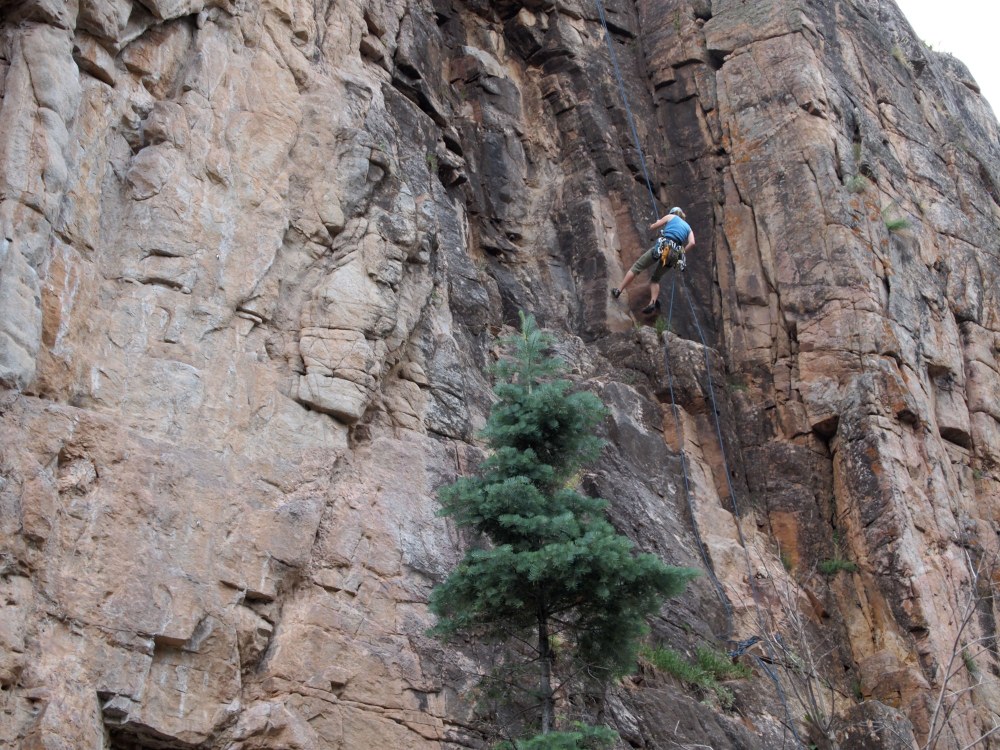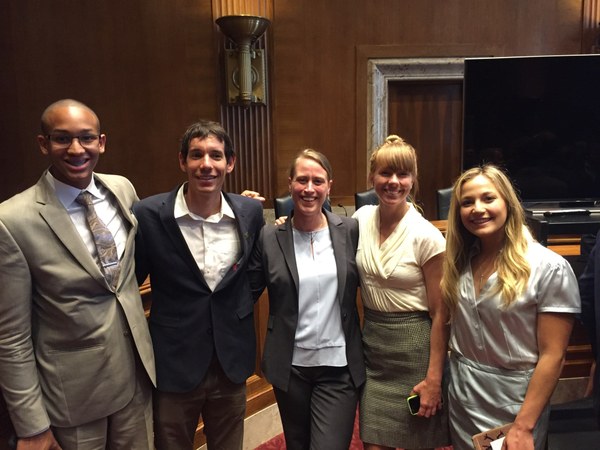
Some people have a defining moment in the outdoors that changed their lives. I don’t. I can recount a vague memory of camping with my dad, and him pulling me out of the tent in my pajamas to hike under a full moon. I can tell you that you couldn’t keep me out of waterfalls as a kid, that climbing for the first time as a sixth-grader blew my socks off, and that learning how to crack climb in Indian Creek, Utah 20 years later was completely humbling and inspiring. What I know is that our public lands are integral to who I am, and because of that I believe it’s imperative that we protect these places and the experiences they provide, and that we work to provide opportunities for everyone to have nature-based experiences.
2017 greeted outdoors lovers with a dizzying flurry of public land bills – most of which are quite troubling; however, we’re already seeing the power outdoor enthusiasts have to affect change. When people speak on behalf of the places they care about, lawmakers listen. That’s why we all need to stay informed, get engaged, and take action. It’s also why we created a way for Mountaineers members to learn about and follow significant legislation relating to the wild places where we play. The Legislative Trail Map on mountaineers.org highlights the public lands bills we are tracking and provides ways to take action.
Here are some recent issues The Mountaineers has shared with our community for engagement:
The 115th Congress passed a “rules package,” which contained a provision [Section 3(q)(1) of H.Res. 5 (p. 35)] allowing lawmakers to transfer federal lands to the state without accounting for the economic ramifications. While a rules package is normal for a new Congress, the provision bolsters a campaign to cede public lands to state control, where weaker protections and management resources can open the door to privatization of these places. States manage public lands with different mandates than the federal government, and this makes it easier to sell our public lands off to developers — which means the end of access to, and protection of, these natural places.
In late 2016, the Bureau of Land Management finalized its Planning 2.0 initiative which would have created a whole new level of public participation, creating a more transparent process that gives lots of opportunities for those of us who love public lands to shape how those lands are managed. The Mountaineers believes land planning is important because it governs what uses are allowed and where they are allowed on our public lands. Planning is also the headwaters for new protective designations like “Wilderness” and “Wild and Scenic Rivers.” Unfortunately, Planning 2.0 was repealed in early 2017.
While these are two instances of steps backwards in public lands protections, there are a number of legislative efforts, many from our public lands champions here in Washington, including:
- A bipartisan resolution, led by Congressmen Reichert of Washington and Lowenthal of California, that calls on Congress “to recognize America’s federal public lands as national treasures and to preserve them for future generations.”
- The Mountains to Sound Greenway National Heritage Act has been reintroduced. This bill would help protect the 1.5 million acres of land making up the Greenway, extending from the Seattle waterfront to Ellensburg. This landscape is a significant destination for our members, as we can enjoy every activity offered by The Mountaineers in this watershed. As the population of the Puget Sound continues to increase, protecting this place and planning for use is incredibly important.
- The Methow Headwaters Protection Act, which seeks to protect that valley from large-scaling mining, has been reintroduced by Senators Cantwell and Murray. This place is such an important landscape and recreation destination — exemplifying the intersection of conservation and recreation. We appreciate both senators’ leadership to protect everything the Methow Valley provides.
- The Wild Olympics Wilderness & Wild and Scenic Rivers Act has been re-introduced by Congressman Kilmer and Senator Murray. From the crashing waters of Sol Duc Falls to the ancient 300- foot trees of South Quinault Ridge, this legislation safeguards world-class nature experiences for future generations. Local residents and business have lined up in support, citing the designations as a boon to quality of life, clean water, and the recreation economy. The Mountaineers’ connection with the peninsula started early with our members advocating for the establishment of Olympic National Park in the early 1900s. We feel lucky to continue educating, advocating, and providing stewardship opportunities to ensure the greater recreating community experiences this place as well.
This spring, both Mountaineers’ CEO Tom Vogl and I had traveled to Washington, D.C. to connect with lawmakers, land managers, and partner organizations about issues affecting the places where we play. We both returned to Washington State with renewed hope for the future of outdoor recreation and our national public lands. While these trips signify only one step in what must continue to be significant, focused work to protect the outdoor experience, our wild places have some great champions. Every one of the Washington delegation offices we met with reiterated their support for our national public lands, regardless of party affiliation. Land management agencies showed their continued interest in decreasing barriers to get more people outside to experience our public lands. And we were also reminded that we are part of a large community and industry that is standing up for the outdoors. Mark Menlove, Executive Director of our partner Winter Wildlands Alliance, may have put it best when he said, “I take huge comfort and find deep inspiration in the knowledge that we have found our collective voice, and that voice is powerful.”
 Left to right: Kai Lightner, Alex Honnold, Katherine Hollis, Libby Sauter, and Sasha DiGiulian in Washington, D.C., May 11, 2017
Left to right: Kai Lightner, Alex Honnold, Katherine Hollis, Libby Sauter, and Sasha DiGiulian in Washington, D.C., May 11, 2017
The Mountaineers will continue to follow public lands policy and offer our community ways to engage in issues. While there is significant work ahead of us, we believe there is much to be optimistic about: our wild places have some great champions. In what can seem like a disparate world, The Mountaineers will still keep doing what we do: getting people outside safely and responsibly through amazing volunteer dedication, and protecting the outdoor experience. At the end of the day, the outdoors brings us together to explore, share, and ultimately to protect the experiences they provide.
Want to learn how to advocate for the places where we play? Take the Outdoor Advocates Network eLearning course Protecting Public Lands 101 and start engaging in advocacy efforts today! Mountaineers members can access the course here and earn their Public Lands Conservation 101 badge. Non-members can access all of the same information here.
 Katherine Hollis
Katherine Hollis